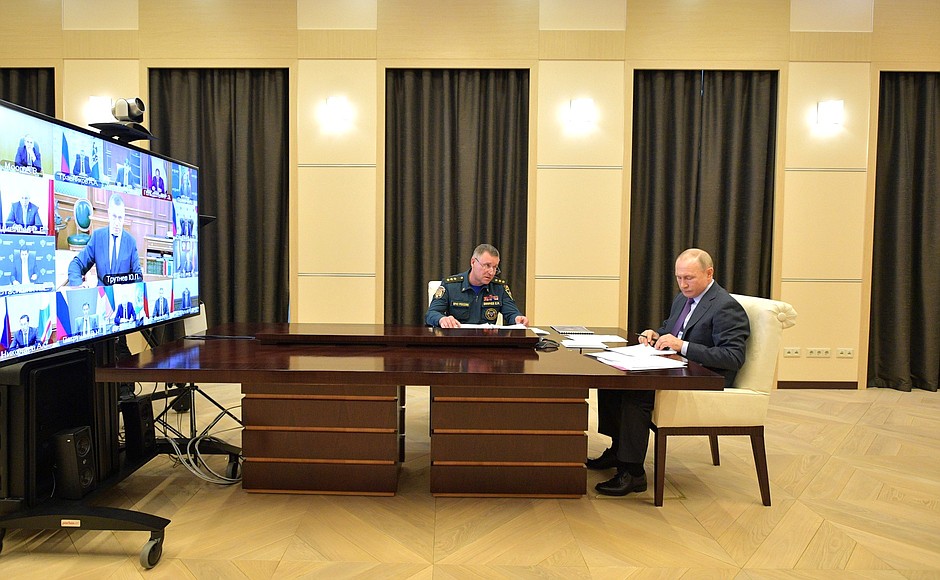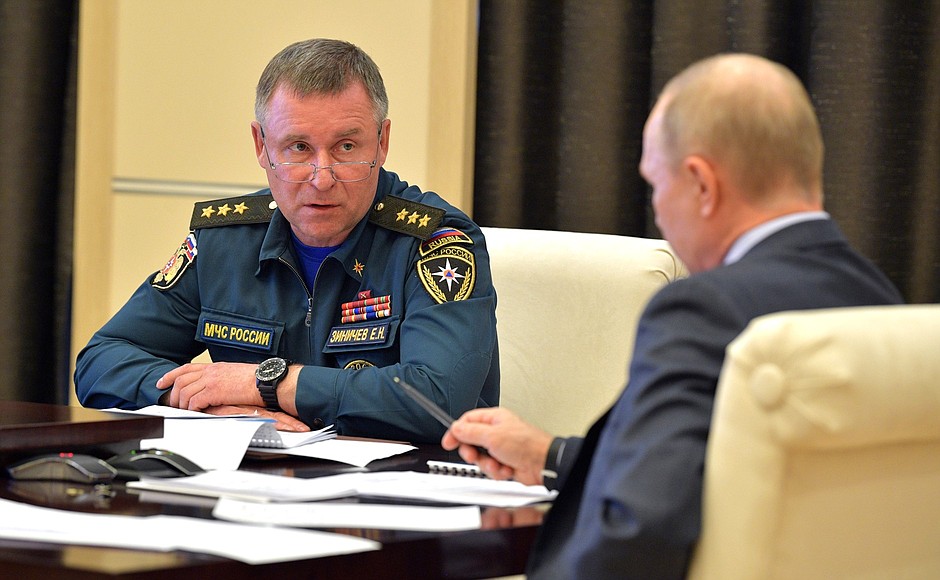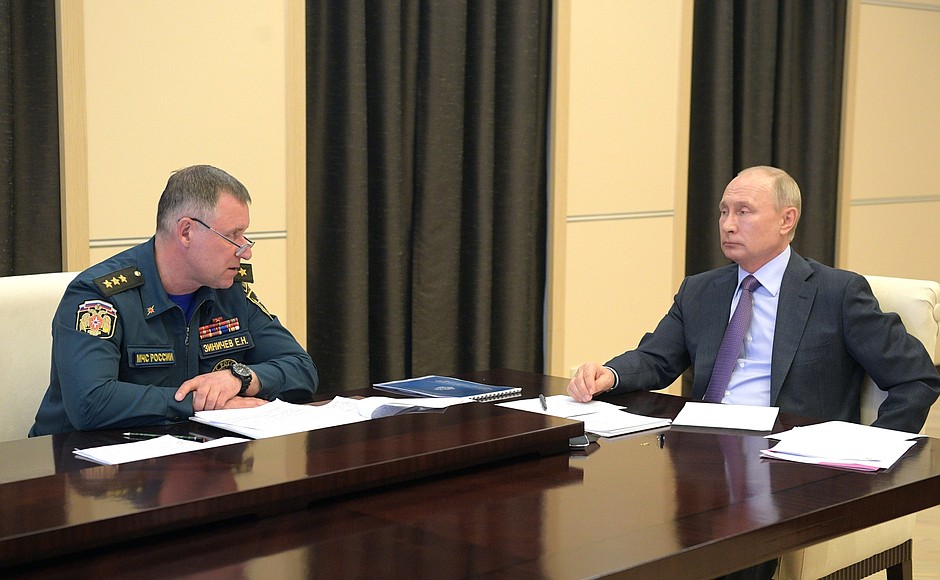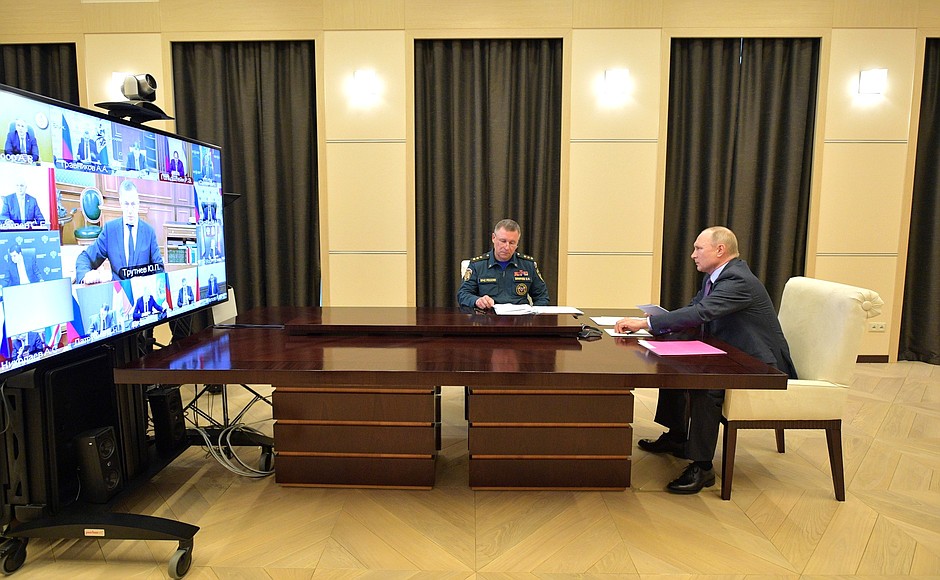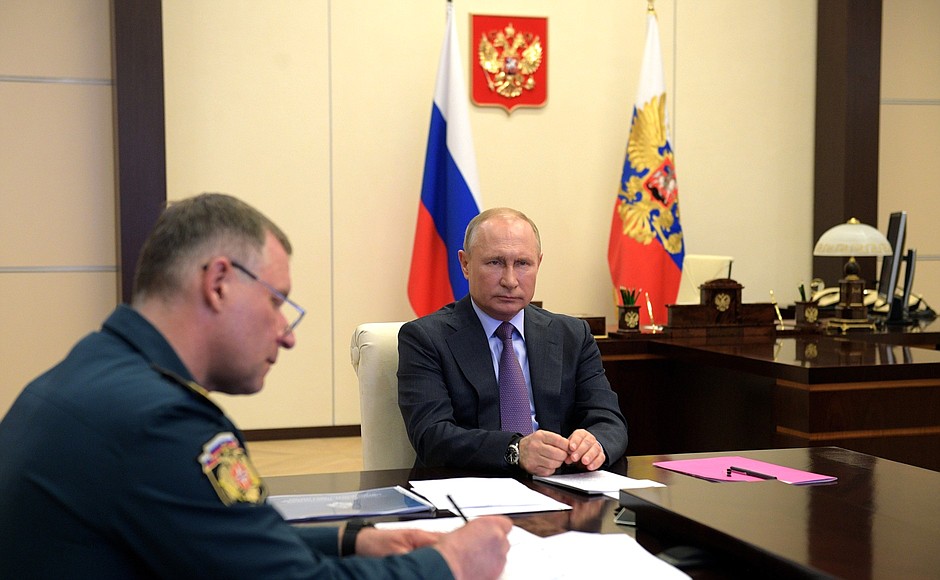The meeting was attended by Deputy Prime Minister – Presidential Plenipotentiary Envoy to the Far Eastern Federal District Yury Trutnev, Deputy Prime Minister Marat Khusnullin, Aide to the President Maxim Oreshkin, Minister of Transport Yevgeny Ditrikh, Minister of Civil Defence, Emergencies and Natural Disaster Relief Yevgeny Zinichev, Minister of Natural Resources and Environment Dmitry Kobylkin, Minister for the Development of the Russian Far East and Arctic Alexander Kozlov, Minister of Agriculture Dmitry Patrushev, Minister of Finance Anton Siluanov, Minister of Construction and Housing and Utilities Vladimir Yakushev, Head of the Federal Service for State Registration, Cadastre and Cartography (Rosreestr) Oleg Skufinsky, as well as governors of the Republic of Sakha (Yakutia), Trans-Baikal Territory, Krasnoyarsk Territory, Amur Region, Kemerovo Region – Kuzbass, Novosibirsk Region, Tyumen Region, and the Jewish Autonomous Region.
* * *
President of Russia Vladimir Putin: Colleagues, good afternoon,
We understand very well that all the efforts are now primarily concentrated on countering the spread of the coronavirus. However, this must not divert our attention from other potential threats to people’s lives and safety. Moreover, as we also know, the spring and summer time has come, which means that there is a significant increase in the risk of seasonal natural disasters – wildfires and floods, especially in the Far Eastern and Siberian federal districts. The current situation in several regions is already quite difficult, and today we will discuss this in more detail, focusing on concrete decisions that must be made now.
In general, every Russian region must be one hundred percent ready to respond to any emergency, to any development, and all the necessary resources must be fully mobilised.
This is why I am asking you first of all to provide the latest information on the current state of affairs in general and to make a prognosis on where the situation with floods and wildfires might deteriorate and which preventive measures are being taken in this regard; what has already been done and what is planned in order to increase the protection of populated areas and key facilities of vital infrastructure.
I am also asking you to focus on the work carried out by the Emergencies Ministry and the regions to promptly inform people and ensure their safety in general.
I am marking this issue as special. Right now many people are staying at home, in self-isolation or quarantine, their movements are objectively restricted. Hospitals, orphanages and nursing homes are working in special mode.
With this extraordinary situation unfolding, we have to specify all the plans for warning citizens of threats, for organising efforts to evacuate and to offer them temporary accommodation, if necessary, and for providing medical and other assistance.
Once again: all these issues should be considered thoroughly, including in order to avoid natural emergencies leading to local spots or outbreaks of the coronavirus infection.
And, of course, special control should be taken over all cases that involve families or citizens who have lost their property, homes or flats, and are now left without any bare essentials. Financial and material assistance, as well as payments and compensations, should be made instantly. I am aware of the problems that regional budgets are facing now, but providing help to the affected citizens and ensuring their safety is a priority. Federal agencies should engage in these efforts and respond promptly and without prevarication.
I would like to ask colleagues from the regions today to thoroughly discuss such cooperation between the regions and the Federation, and make sure there are no so called debts or outstanding obligations by the federal budget regarding the implementation of previously adopted decisions and measures aimed at emergency prevention and relief efforts.
Another important thing to note. I know that our rescuers are working competently, fearlessly and courageously, and they are ready to perform their duties in any circumstances and take risks to save others. But now they themselves have to strictly observe preventive measures.
I am instructing you to pay special attention to ensure maximum safety of the Emergencies Ministry teams, as well as staff members of all agencies and services, and volunteers involved in natural disaster relief efforts.
Let us get down to work.
<…>
Vladimir Putin: In conclusion, I would like to thank you for today's substantial discussion. I think it is important that we have made a comprehensive analysis of the current situation. It seems to be stable and under control in general, although we know how fast things can change.
In this connection, I instruct you to continue with the ongoing monitoring and take all necessary measures to prevent risks, particularly at early stages. Once again, I ask all of you and your colleagues in the regions to be ready to take emergency action.
Now I will speak about the problems that have been mentioned and specified today.
First, this year we are working amidst the coronavirus pandemic. We have already mentioned this, as I said. We are well aware of this. In this regard, I ask you, taking into account the forecast for the situation in certain regions as well as for epidemiological situation, to decide on the required volumes of personal protection equipment for members of Emergencies Ministry teams and other services and organisations, as well as volunteers, and to urgently prepare necessary and sufficient reserves.
Second, at last week's meeting on developing the national automotive industry, I spoke about the decision to purchase additional 25,000 vehicles for federal agencies. I instruct you to provide, on a priority basis, extra rescue, fire-fighting and other equipment to regional Emergencies Ministry subdivisions as part of such purchases, particularly in those regions that are facing the highest risks of fires and floods.
Finally, third: today, our colleagues from the regions have mentioned problems with receiving funding from the federal budget. Decisions have been adopted and coordinated but there are no results. This is not only due to a shortage of funds. We have worked it out and see now that the Road Fund has the finances but they have not been forwarded for proper goals due to unnecessary formalities. The roads that were damaged by last year's floods in the Amur Region have yet to be repaired, and people have to drive over potholes. Just try to take a drive on such roads, and you will understand that actions need to be taken faster.
Another similar example of decisions not being executed. A year ago, I instructed the Government to implement a set of measures to strengthen fire protection of the Trans-Baikal Territory. Now the Governor said that the work is going slowly. In the autumn, a corresponding plan was developed, but then the procedures, including at the federal level, were delayed, and the region still has not begun the actual implementation of this plan. But look, there are questions of paramount importance and there are secondary ones. Everything is important, but when it comes to the consequences of emergencies, or the prevention of emergencies, this should be a priority. As a result, there are fires again, and the fire infrastructure is still underdeveloped.
As I said last week, it is not enough just to announce the decisions. This is not enough. They should be fully implemented so that they have a tangible, real impact on people's lives.
I am asking our colleagues both in the Government and in the regions to resolve the issues mentioned as soon as possible. I am asking the regional heads to organise the relevant work on the ground. I am instructing you once again to analyse the entire mechanism for providing financial assistance and other measures to support citizens. We just talked about this in relation to those whose houses burned down. To provide assistance to business, and at the federal level – to regions in the event of natural disasters. To search for systemic problems and inconsistencies, and to make specific proposals for resolving them.
And in general, I am asking the Government to consider all the proposals made today by the regions, including on legislative changes, and to be sure to take them into account in practical daily work.
I would like to express hope that we will all work more consistently, and this will lead to the results that the country and the people need.
Thank you for your attention. Thank you. All the best.
